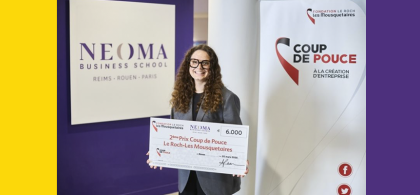
PROTEANOVA : des étudiants sur la piste d’une céréale oubliée
Publié le 16/06/2025
Six étudiants* de NEOMA et d’AgroParisTech veulent relever les défis du système agricole et alimentaire, en particulier écologique. Ils veulent pour cela exploiter le potentiel d’une céréale oubliée, le millet, et en faire en un ingrédient riche en protéines naturelles, peu transformé, et sans gluten pour les industriels. Explications.
1/ La naissance d’une idée
Les étudiants de Masternova* de NEOMA, également inscrits à AgroParisTech, suivent chaque année un module de fin d’études, le Proj’Innov. Le but : monter une startup dans le secteur de l’agro-industrie et bio-industries, puis développer tous ses aspects. C’est dans ce cadre que six d’entre eux ont imaginé une solution « Protéanova ».
Point départ : une idée d’un membre de l’équipe, Allan Leconte, fils d’agriculteur, d’explorer le potentiel du millet. Qu’est-ce que le millet ? Le millet est une céréale rangée depuis longtemps au fin fond des greniers. Pourtant, elle a une qualité : elle est résiliente. Elle nécessite en effet peu d’eau et de produits chimiques, idéales pour répondre aux enjeux environnementaux actuels.
Ce nouvel ingrédient pourrait notamment remplacer certains additifs dans les produits transformés, en apportant des propriétés de texture, d’émulsification ou encore d’aromatisation, tout en étant plus naturel et durable. L’objectif de Protéanova est de créer un ingrédient fonctionnel, riche en protéines naturelles, peu transformé, sans gluten, pour l’industrie agro-alimentaire.
*Le Masternova (ou Mastère Spécialisé® Masternova) à NEOMA Business School est une formation d’un an, en alternance, co-délivrée avec AgroParisTech, qui vise à former des managers capables de piloter l’innovation dans les secteurs des agro-activités et des bio-industries.
2/ Des appels à projets, des programmes d‘accompagnement, des incubateurs
Les étudiants sont partis bille en tête : avoir « une preuve de concept » d’ici la fin de l’année. Ils voulaient donc démontrer la faisabilité de leur idée avant d’investir davantage de ressources dans son développement. « Et pour ça, il faut avoir les moyens, aller dans les laboratoires », expliquent-ils.
Pour commencer, ils ont déposé un dossier à la Fondation AgroParisTech en novembre 2024. Bonne pioche : ils ont été récompensés dans la catégorie "Maturation" et obtenu un financement de 4 000 euros. Cette première reconnaissance leur a permis de structurer son idée. Ensuite, l’équipe a intégré plusieurs programmes et incubateurs.
- Le programme Shaker du Genopole, un biocluster qui rassemble entreprise et chercheur dans la biotechnologie. Les lauréats ont un accès 7 jours sur 7 à un laboratoire pendant six mois, avec l’objectif de réaliser une preuve de concept.
- L’incubateur Food’InnLab d’AgroParisTech, spécialisé dans les tests applicatifs et la caractérisation des ingrédients. Les InnLabs c’est un réseau d’incubateurs thématiques d’AgroParisTech. Celui de Food’InnLab est dédié à l’alimentation.
3/ L'ambition
Leur intégration dans ces dispositifs permet donc aux étudiants de réaliser des tests, notamment sur les différents ferments. Il s’agit de trouver celui qui débouche sur un millet aux propriétés fonctionnelles, texture, goût, émulsification…, optimales. Puis de faire une étude de marché sur les véritables besoins des industriels, et les applications du produit. L’ambition de nos étudiants est même de créer une filière complète, de la production agricole jusqu’à l’ingrédient fini, apportant de la valeur ajoutée aux agriculteurs français.
*Les étudiants AgroParisTech et NEOMA Business School : Tess Bachaud, Claire Dehuysser, Thibault Desbois, Arno Dignan, Sophie Fouché, et Allan Leconte.




